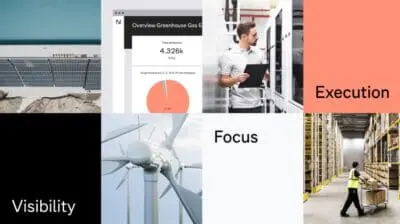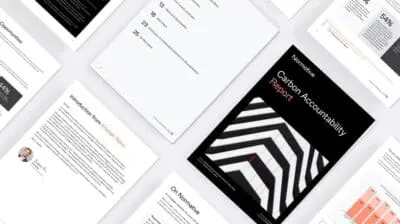Normative at COP28: catalyzing climate action

Normative will join COP28 as part of the Swedish business delegation
COP is arguably among the most important climate events of the year. Organized by the United Nations, it gathers government officials, business leaders, scientists, climate experts, NGOs, and civil society to set the direction for the year to come.
Once again, Normative will take part in COP28 as part of the official Swedish business delegation, alongside companies like Einride, Polestar, and IKEA. The delegation is mandated to support the Swedish government’s climate targets and invites companies whose solutions can help accelerate net-zero progress.
This year’s conference is special, as it features the first “Global Stocktake” – an assessment of the progress the world has made in meeting the climate targets set out under the Paris Agreement. Based on the UNFCCC’s synthesis report released in September this year, the Global Stocktake’s verdict is likely to be disappointing, as progress made in reducing emissions is not nearly enough to keep global warming below 1.5C. All eyes are now on world leaders and businesses attending this year’s conference to see if they will use this report as a catalyst for action.
In this article, we’ll highlight some changes we think can contribute to improving the trajectory.
Improve accuracy & standardization in carbon accounting and disclosures
Widely used carbon accounting standards such as the Greenhouse Gas Protocol and PCAF, and mandatory disclosure regulations – such as the CSRD, SFDR, and SECR – are designed to provide much-needed guidance and aligned standards. However, carbon accounting still suffers from a general lack of accuracy, transparency, and comparability.
According to a 2021 survey from Boston Consulting Group, businesses estimate an average error rate of 30% to 40% in their emissions calculations. With such errors, it’s hard for companies to make informed decisions on where to focus their reduction efforts. It also makes it difficult for investors, consumers, and other external stakeholders to assess and compare climate performance between companies.
To improve the accuracy and comparability of corporate emissions reports, we believe it’s necessary to:
- Close the existing methodological gaps in carbon accounting.
- Increase harmonization between various standards.
- Heighten requirements on the collection of primary data for scope 3 emissions.
- Create better solutions for tackling value chain emissions.
Greater harmonization between product, company, and portfolio carbon footprints
Logically, carbon footprints at the product, company, and portfolio levels should be consistent. Product carbon footprints should add up to the company carbon footprint, which should add up to the portfolio carbon footprint. That is not the case today, as the standards for the different levels are not sufficiently harmonized.
One reason for this is that the standards have been developed by different actors at different times. Another factor is that they all rely too heavily on modeled data from industry averages rather than primary data from the value chains.
Increase primary supply chain data collection amongst enterprises
Today, scope 3 emissions calculations rely heavily on rough spend-based estimates and industry average data. This approach comes from a place of pragmatism, trading off some accuracy for practical feasibility. While the estimates aren’t accurate, they can give an initial overview of emission hotspots and are often much easier to generate than more accurate figures for which primary data has to be collected.
With 90% of emissions originating in the value chain for most enterprises, however, we see a great need for improving the granularity and accuracy of scope 3 calculations. To do this, we need to move away from average data and estimations, and towards collecting data directly from the suppliers in the supply chains. We shouldn’t aim to perfect our spend-based estimates, but rather to gather more and more actionable scope 1 and 2 data directly from the value chains. This will give the granularity and level of insights needed to drive effective reduction.
Calculating and managing scope 3 emissions can feel impossible – until you realize that your scope 3 emissions are someone else’s scope 1 and 2. And we know how to reduce scope 1 and 2 emissions. A quarter of global emissions come from energy, while 14% come from transportation, and we already have technology available to address these sources. A value chain leader who knows their suppliers’ scope 1 and 2 emissions – not based on estimates, but from collecting that data directly from the supplier – can suggest, support, and finance the transition to renewable energy or electric transportation.
Solutions for calculating and reducing value chain emissions at scale
To help with the transition to more primary supply chain data, the world needs technology and partnerships to support such data collection – a new infrastructure for managing value chain emissions at scale. We have taken important steps towards that end. Our recent product release makes it easier for enterprises to collect primary data from their suppliers, and we are the founding partner of project Perseus, a collaboration between the UK government, the UN, and various partners to automate collection of primary emissions data from energy. But this is a huge challenge and an area where we think there is ample opportunity for new innovation and partnerships.
Accurate, reliable, standardized, transparent, and comparable carbon data has to be a foundational piece of an efficient carbon market. It gives companies the level of insights they need to make effective reduction decisions, allows investors to properly assess climate risks and performance, and gives consumers the chance to vote with their feet. With robust carbon accounting, greenwashing will be exposed more easily, eventually becoming just about as attractive as lying about your financial results.
To make globally standardized and robust carbon accounting feasible, we need new innovation and partnerships. We need to enable businesses to share carbon insights and collaborate on reduction. We need to make carbon visible. All of these challenges are significant and require cooperation and knowledge sharing from various actors, something that we are proud to experience with our own network of partners already. COP is an important forum for such conversations, which is why we are excited to participate and do what’s in our power to change the trajectory towards a net-zero aligned global economy.
Follow Normative at COP28
Explore Normative’s COP28 livestreams, insights, and partners.











